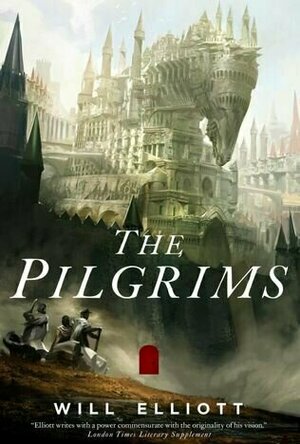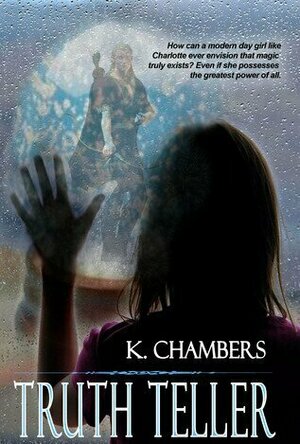Phil Leader (619 KP) rated The Pilgrims (Pendulum #1) in Books
Nov 25, 2019
The story follows them as they travel across this new land of Levaal and encounters various inhabitants - human and other races. There has been a war simmering between The Castle - ruled by the (not to beat about the bush) insane Vous - and a coalition of still-free cities governed by their respective mayors. Eric and Case arrive just as the war is about to become a full battle, and it's clear that this is not a coincidence.
I'm always wary of fantasy books where people cross from this world into the world of the writer's imagination, it always seems like a bit of a fanboy's wet dream and sometimes it isn't handled well and leaves a lot of holes. Elliott does adequately well in addressing these - Eric (at least) does not cross by accident, the magic that brings them to the world allows them to speak the correct language and so on. Elliott also wisely immediately plunges the antagonists into action, revealing the wonders of Levaal rather than letting them frolic on some untouched green hillside.
The other notable deviation from this being any sort of wish fulfillment fantasy is that Levaal actually isn't very.... nice. Danger, intrigue and double dealing abound. Vous could be nominally labelled as the 'bad guy' but it's clearly described that he is doing what are bad things for what he considers the right reasons. There are no 'dark lords' here and by the same token the 'good guys' really aren't particularly good.
Eric and Case are not spared from this. Neither is a paragon of virtue, Eric has some distinct character flaws, which are made very clear to him by other characters and perhaps at least some of the arc of the trilogy will be Eric becoming a 'better' person. Case has served time in prison for murder and is an alcoholic, the latter fact makes him behave erratically at best.
The inhabitants of Levaal do not deviate far from stock fantasy races, but all are unique and the world does seem to fit together and work quite well as a 'real' place, I did like the mechanism of how the magic worked and its limitations. Elliott has really put some thought into this.
The writing is hard to find fault with; the descriptive passages have real atmosphere, the dialogue is sharp and always in keeping with the characters, which in themselves are complex and nobody is represented as a cipher or standard trope. The story is engaging and moves at a terrific pace, covering a lot of ground (both metaphorically and across Levaal).
The ending is a real cliff hanger with a sting in the tail and it will be interesting to see where the story goes in the next volume, Shadow.
Highly recommended, though not for younger readers due to explicit sexual references.
Phil Leader (619 KP) rated Truth Teller (The Truth Teller Series #1) in Books
Nov 27, 2019
But if you are a little older, nicely into double figures of age. Although the escape to another realm is still a terrific idea, the talking animals are just not going to fit anymore. What you need is a bit of action and likeable characters who are realistic while still being elves and dwarves. But if Narnia is no longer a viable destination at that age, where is?
Truth Teller fits the bill perfectly. Charlotte is a normal ten year old girl on holiday with her family. While wandering around the shops of the local town she finds a strange curio shop. She finds one of the objects in the shop interesting - a sort of snow globe without any snow. The odd little man who runs the shop gives it to her for free, but warns her that the price she pays might not be of the monetary kind.
That night while studying the globe she feels if she is falling into it and finds herself in a cold woodland, where she meets Elder. Very soon it is apparent to her that she is not anywhere near where she should be, if she is even on Earth at all anymore. Elder is an elf and he and his family try to help Charlotte find her way back home. Meanwhile dark forces are stirring and rumours of invasion are spreading.
Chambers has set out to provide an entry point into fantasy for younger (female) readers and has done a sterling job. My immediate reaction to this book was that it is flawless, in idea and execution. Although perhaps a little cliched for grizzle fantasy readers like myself it contains just enough strange creatures - elves, dwarves, giant wolves and druids - and a sprinkling of magic here and there to whisk the plot along. And it is whisked at some pace too, the narrative fluid and always in motion towards the books conclusion without much of a pause for breath.
Charlotte as the main character is well written and prone to modern turns of phrase that baffle her elven friends. Elder the elf boy she meets is charming and friendly even though he is as confused by Charlotte's plight as she is. The other characters are also very well drawn.
The story entwines the various threads into a whole that is easy to read and hard to forget. Reaching the last page was something I dreaded but like a lot of things the end of this book is just the start of the story of the Truth Teller.
If anyone is looking for a first book in fantasy, without the talking animals, this book fits the bill perfectly. Narnia for the iPhone generation? It's pretty close to that.
Gareth von Kallenbach (980 KP) rated The Maze Runner (2014) in Movies
Aug 6, 2019
In the film, the action starts right out of the gate with a boy in a cage being delivered up to a strange place. Upon his arrival, he encounters a group of boys, each of which arrived in the same way. The boys created a sort of primitive community in a beautiful green glade. Each boy is assigned a specific role in order to contribute to their survival. None of them are able to remember where they came from or their life before arriving.
The plot quickly begins to revolve around the boys who have been deemed maze runners. The glade in which the community resides is surrounded, or I should say enclosed, by a gigantic stone maze. The maze runners run through the maze trying to find out more about it in order to eventually escape. But, the maze is unsolvable because it changes shape each day and is too dangerous to stay in overnight.
The main protagonist Thomas (Dylan O’Brien) quickly interjects himself into the maze runner role, against the wishes of the community. But it isn’t long until he proves himself capable of the role when he becomes the first boy to kill what they call a “griever.” His arrival marks the beginning of new hope for the boys’ escape. At this point, one must wonder why none of the boys had ever killed a “griever” before the arrival of Thomas.
The “grievers” are cyborg spiders residing within the maze. They are the main threat keeping the boys confined to the glade, and they come off as an incredibly hokey aspect of the film. However, this may be really enjoyable for fans of corny science fiction.
I have not had a chance to read the series myself, but something tells me details were left out of the film which would have brought the quality of the plot up a level.
Unfortunately, the plot is poorly developed in crucial areas which could have made the film great, had they been further developed. For example, the creators of the strange place and the robotic spiders are not given much depth. The lack of detail in this area is what gives the execution of the plot a make-believe feel. Perhaps this part of the plot is purposefully left open to lay the ground work for the rest of the series to be made into film.
All criticism aside, what makes “The Maze Runner” enjoyable is that it stems from a unique idea. It takes the audience on a new adventure. However, I would hardly say the film aims to please a young adult audience. Its execution seems tailored for tweens. It lacks any real graphic violence, staying well within its PG rating.
I give “Maze Runner” 3 out of 5 stars.

Create a Car
Education and Games
App
Create a car and drive it! Create a Car is a top-selling creativity app for children ages 3 to 6. ...

ABC Magnetic Land: Learn Alphabet,Shapes & Letters
Education and Games
App
***** A title from our extremely successful series: the last three titles (ANIMAL PRESCHOOL SHAPE...

Mermaid Craft: Ocean Princess. Sea Adventure Games
Games
App
Dive under waters of a deep blue sea for a blocky cube exploration adventure! Become a mermaid - a...
games

Cute Nail Art Makeover Salon – Manicure Game Spa With Beautiful Girly Designs
Lifestyle and Games
App
Add cute stickers to your nails and try different shades that will make you a real fashionista! This...

Make A Scene: Polar Adventure
Games and Education
App
The animated sticker app for children with descriptive audio and fun sound effects! Join over half a...

TuneIn Pro - Radio & Sports
Music and News
App
Listen to your favorite radio stations for free with TuneIn Radio. With over 100,000 radio...

Animation Creator HD
Entertainment and Utilities
App
What do you get when you combine the most popular iPad drawing apps and the #1 hottest animation...


